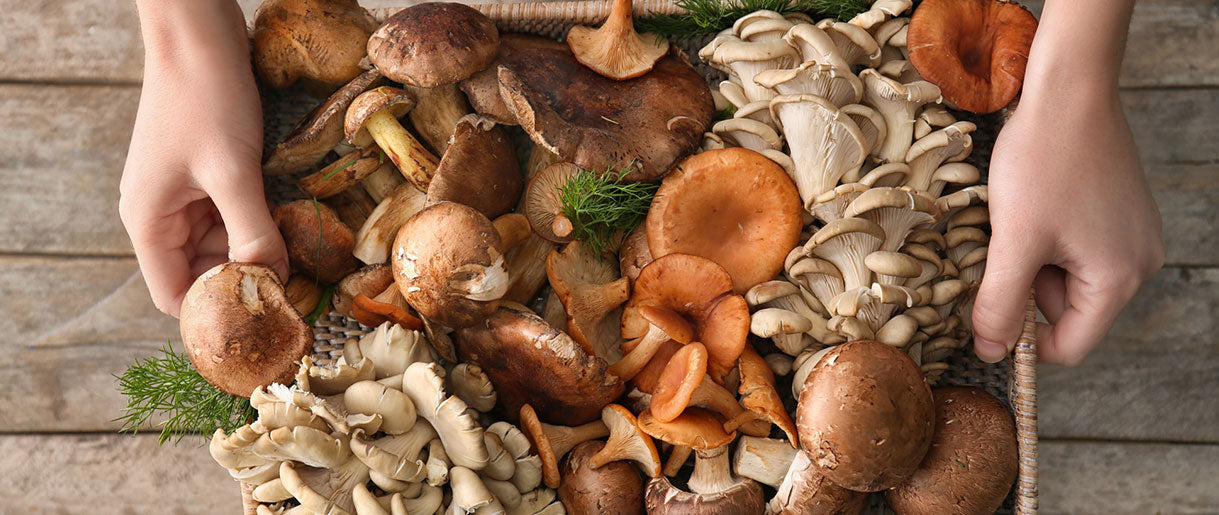Mushrooms have been recognized for their potential therapeutic benefits, including pain management. Certain types of mushrooms, such as Lion's Mane, Reishi, and Chaga, contain bioactive compounds that can help alleviate pain. They work primarily through their anti-inflammatory properties and by boosting the immune system.
Lion's Mane is known for neurogenesis (nerve growth stimulation), which may relieve neuropathic pain. Reishi is well-regarded for its immune-boosting and anti-inflammatory effects, which can indirectly reduce pain. Chaga, loaded with antioxidants, also has powerful anti-inflammatory properties that could help manage pain.
Incorporating these mushrooms into your diet or taking them as supplements could help with pain management. However, consulting a healthcare provider before starting any new treatment regimen is essential.
This article delves deeper into mushrooms and their role in pain management. We'll examine how these natural wonders work, their specific benefits for different types of pain, and how you can incorporate them into your daily routine for optimal results.
A Foray into the World of Mushrooms

A Spectacular Spectrum of Mushrooms
When one thinks of mushrooms, often the first that come to mind are common types such as the white button or cremini. However, the world of mushrooms is incredibly vast and diverse.
They come in all shapes and sizes, from the majestic King Trumpet mushroom, famed for its meaty texture and flavor, to the medicinal Reishi mushroom, recognized for its significant health benefits. At the more exotic end of the spectrum, we find psilocybin mushrooms and so-called 'magic mushrooms,' known for their psychedelic properties.
The Healing Power of Mushrooms
The health benefits associated with mushrooms are as varied as their types. We have edible varieties like the King Trumpet mushroom, packed with essential nutrients and antioxidants. Conversely, we encounter the Reishi mushroom, revered in traditional medicine for its ability to support the immune system and potentially help manage various health issues, including pain.
Further afield, research has investigated the effects of psychedelics, specifically those derived from 'magic mushrooms' and psilocybin mushrooms. Findings suggest potential benefits in managing mental health disorders such as depression, anxiety, and PTSD.
Mushrooms in Medicine: A Historical Perspective
Mushrooms have been intertwined with human history for thousands of years, their uses extending well beyond the culinary sphere. Early human civilizations recognized the medicinal value of certain mushrooms and incorporated them into their healing practices.
In traditional Chinese medicine, for example, the Reishi mushroom was deemed a panacea, believed to promote longevity and overall health. In Central America, 'magic mushrooms' or psilocybin mushrooms were used in spiritual and healing rituals, a practice that caught the attention of the modern Western world in the mid-20th century. This sparked a surge of interest in the potential therapeutic effects of psychedelics, a field of research that continues to the present day.
Unveiling the Complex World of Pain

Pain: More Than a Sensation
Pain, while often unpleasant, is crucial to our body's defense mechanism. It serves as a warning signal that something is wrong, alerting us to injuries and illnesses that need attention. However, when pain persists beyond the healing process, it enters the realm of chronic pain.
Chronic pain, lasting more than three months, is a widespread condition affecting millions worldwide. Unlike acute pain, a direct response to tissue damage, chronic pain can persist even when the initial injury has healed.
Chronic pain conditions include nerve pain, chronic neuropathic pain, phantom limb pain, complex regional pain problems, and disorders such as rheumatoid arthritis and cluster headaches.
Decoding the Causes of Pain
Pain can result from a multitude of factors. Acute pain often arises from an identifiable injury or condition, but the causes of chronic pain can be more elusive. Chronic pain can stem from ongoing conditions such as rheumatoid arthritis, but it can also persist without a discernible physical cause, often intertwining with psychological disorders.
Chronic pain syndromes like phantom limb pain, where pain is felt in a limb that has been amputated, and complex regional pain disorder, a chronic pain condition that typically affects a limb, underscore the complexity of pain pathways and our understanding of them.
Advances in brain imaging research have helped illuminate how pain signals are processed in different brain regions, improving our understanding of these complex conditions and opening up new avenues for treating chronic pain.
Standard Approaches to Pain Management
Anesthesiology and pain medicine have traditionally led the charge in managing both acute and chronic pain. Pain medicine, ranging from over-the-counter analgesics to prescription opioids, is often the first line of defense in treating pain. However, these come with their risks, including dependency and side effects, which makes the search for alternative treatments to manage pain an ongoing endeavor.
A comprehensive chronic pain approach may include physical therapy, psychological support, and lifestyle modifications. Increasingly, attention is being paid to the role of diet and natural substances in pain management.
For instance, medicinal mushrooms and their active compounds, such as the nerve growth factor in Lion's Mane mushroom, have shown promise in managing chronic pain, including complex conditions like chronic neuropathic pain and phantom limb pain. For example, Lion's Mane can treat neuropathy, one of the leading causes of pain in people with nerve damage.
This adds another layer to our understanding of how to treat chronic pain and underscores the potential of natural substances in managing complex regional pain problems and improving functional brain connections. In the following sections, we will delve deeper into how mushrooms, especially their bioactive compounds, could play a role in chronic pain management.
Mushrooms and Pain: An Emerging Connection

Scientific Perspectives on Mushrooms and Pain Management
Scientific research has started to unravel the potential of mushrooms in pain management. A health research initiative has brought to light compelling evidence that certain mushrooms could offer a new avenue to treat pain, including complex chronic conditions like phantom limb pain and complex regional pain syndrome.
A fascinating area of exploration is using psychedelic drugs, such as those derived from psychedelic mushrooms, in pain management. Recent studies suggest that(1) psychedelic drugs promotes neuroplasticity—the brain's ability to reorganize itself by forming new functional brain connections. This ability is thought to underlie the proposed mechanism for how these substances can relieve pain.
Moreover, emerging research has pointed out that a profound psychedelic experience can help individuals deal with pain on a psychological level. Through a process that shares similarities with mindfulness meditation, individuals may learn to approach their pain to promote healthy functioning rather than exacerbate distress.
The Role of Bioactive Compounds in Pain Relief
The pain-relieving potential of mushrooms is linked to their bioactive compounds. For instance, certain mushrooms contain compounds that directly interact with the systems in our body responsible for sensing pain, thereby potentially reducing the pain caused by conditions like nerve damage.
Additionally, certain psychedelic drugs derived from mushrooms have shown promise in managing pain. For example, research has shown that these substances, by promoting new functional brain connections, can alleviate certain mental health conditions. This suggests that they might also be effective in treating pain associated with these conditions, such as cluster headaches.
Anti-Inflammatory Properties and Immune Support
Mushrooms are well-known for their anti-inflammatory properties, critical in chronic pain relief. By reducing inflammation, these mushrooms can help to alleviate pain at its source.
Moreover, mushrooms have the potential to boost the immune system. A healthy immune system is crucial for the body to promote healing and manage pain effectively. As such, incorporating mushrooms as an alternative therapy into a comprehensive approach to pain management could be a beneficial strategy.
Shining the Spotlight on Specific Mushrooms for Pain Relief
1. Lion's Mane Mushroom: The Nerve Healer

Lion's Mane mushroom is an edible and medicinal mushroom used in traditional Chinese medicine for centuries. It is recognized for its unique appearance, resembling a cascade of white tendrils, and its nutritional benefits.
The Lion's Mane mushroom contains an active compound known as hericenones, which promotes the production of the nerve growth factor. This can contribute to pain relief, particularly in nerve damage or neuropathy conditions. The stimulation of nerve growth can help restore normal nerve function and lead to a profound reduction in pain.
Research into the pain-relieving benefits of Lion's Mane is still in its early stages. However, preliminary studies suggest(2) a potential role in managing neuropathic pain, making it a promising area for future research.
2. Reishi Mushroom: The Immunity Booster

Reishi mushroom, known as the "mushroom of immortality," is a staple in traditional Asian medicine. It is known for its glossy, reddish-brown cap and its medicinal properties.
The Reishi mushroom is revered for its immune-boosting effects(3), which can indirectly relieve pain. Boosting the body's natural defense system can enhance its capacity to manage and mitigate pain. Reishi has potent anti-inflammatory properties that can further contribute to pain relief.
Several studies have pointed to the beneficial effects of Reishi in managing various health conditions, including those related to chronic inflammation. However, further research is needed to establish its role in pain management.
3. Chaga Mushroom: The Inflammation Fighter

Chaga mushroom, found primarily on birch trees in cold climates, is a powerhouse of antioxidants. It is highly valued for its potential health benefits, including its capacity to reduce inflammation.
The anti-inflammatory properties of Chaga mushrooms can help alleviate pain at its source. Reducing inflammation can help manage pain resulting from various inflammatory conditions.
Studies(4) on the Chaga mushroom have shown its potential to reduce inflammation and manage pain. Future research is set to explore this potential further and to understand the mechanisms behind its anti-inflammatory properties. More research is also needed to understand the health benefits of Chaga mushrooms fully.
4. Cordyceps Mushroom: The Energy Enhancer

Cordyceps is a genus of parasitic fungi that includes over 400 species. Cordyceps mushrooms have long been used in traditional Chinese and Tibetan medicine for their health-promoting properties.
Cordyceps increase energy by enhancing cellular energy production, contributing to overall well-being and potentially aiding pain management. Some research suggests(5) they may also have anti-inflammatory effects, which could help alleviate pain.
Evidence from studies points towards the potential benefits of Cordyceps in managing several health conditions. As far as pain management is concerned, while research is ongoing, initial findings point towards a potential role in managing chronic conditions that can cause pain, such as cluster headaches, through improvements in brain connectivity.
Practical Application: Making Mushrooms a Part of Your Pain Management Routine

Methods of Mushroom Consumption for Pain Management
Delighting in Dietary Inclusion
One of the easiest and most enjoyable ways to incorporate mushrooms into your routine is through your diet. Many beneficial mushrooms, such as Lion's Mane and Reishi, can be added to various dishes.
From stir-fries and soups to teas and smoothies, the culinary versatility of these fungi makes them a perfect addition to any meal. It's important to note that while you can eat mushrooms raw, cooking may enhance the bioavailability of the beneficial compounds in these mushrooms, aiding in their digestion and absorption.
Supplements for Simplified Consumption
Supplements can be an excellent alternative for those who might not enjoy the taste of mushrooms or want a more convenient option. Mushroom supplements often come in capsules or powders and are available in various concentrations.
Before starting any supplement regimen, understanding the dosing instructions and potential side effects of mushroom supplements is essential. Always consult a healthcare provider to ensure these supplements fit your health needs and current medication regimen.
Tapping into the Tradition of Teas and Tinctures
Mushroom teas and tinctures offer another effective way to ingest these potent fungi. They are easy to consume and can be integrated into your daily routine without much hassle. Moreover, preparing mushroom tea or tincture can be a calming ritual, adding a mental wellness aspect to your pain management plan.
Precautions and Considerations: Safety First!
The A-Z of Allergies and Potential Side Effects
Like any new dietary change, being aware of potential allergies and side effects is crucial. While mushrooms are generally safe, some may experience allergies or intolerance. Start with small doses to see how your body reacts, and always stop consumption if adverse reactions occur.
Navigating the World of Medication Interactions
Mushrooms, especially when consumed in medicinal quantities, can interact with other medications. This is particularly important for those taking anticoagulants, diabetes medication, or immunosuppressants. Always consult a healthcare provider before adding medicinal mushrooms to your routine to ensure they don't interfere with your current medication or health conditions.
FAQs About Mushrooms for Pain
Can Mushrooms Help With Menstrual Pain And Cramps?
Mushrooms have been shown to possess various health benefits, including anti-inflammatory properties, which could potentially help alleviate menstrual pain and cramps. However, limited scientific research specifically links mushroom consumption to relief from menstrual discomfort.
- Reishi Mushroom (Ganoderma lucidum): Reishi has traditionally been used to support the body during stress and fatigue, both of which can be heightened during menstruation. The anti-inflammatory properties of this mushroom might potentially aid in relieving cramps.
- Chaga Mushroom (Inonotus obliquus): Chaga is known for its high antioxidant and anti-inflammatory properties, which could potentially help alleviate menstrual pain and inflammation.
However, it's important to note that while these mushrooms may offer potential benefits, they should not be considered a replacement for medical treatment. Women experiencing severe menstrual pain or any changes in their menstrual cycle should consult a healthcare professional.
Are There Any Risks Or Side Effects To Using Magic Mushrooms For Chronic Pain?
While some research suggests that magic mushrooms, which contain the active compound psilocybin, may have potential benefits for certain types of chronic pain, there are also potential risks and side effects to consider.
- Physical side effects: Use of psilocybin can lead to physical side effects such as nausea, vomiting, increased heart rate, high blood pressure, and in some cases, seizures.
- Psychological effects: Psilocybin is a powerful psychedelic and can cause hallucinations, changes in perception, mood changes, and in some cases, episodes of paranoia or panic. People with a history of mental health disorders, particularly schizophrenia, are advised to avoid psilocybin due to the risk of exacerbating their conditions.
- Legal risks: Psilocybin is classified as a Schedule I drug under the Controlled Substances Act in the United States, making it illegal to manufacture, distribute, or possess. However, the legal status can vary by country and even within different regions of the same country.
- Potential for misuse: Although physical addiction to psilocybin is uncommon, psychological dependence can occur. Furthermore, the unregulated nature of these substances means that purity and dosage can vary, potentially increasing health risks.
Before using magic mushrooms or any psychedelic substance for chronic pain or any other health condition, consulting with a healthcare provider is crucial. Research in this area is ongoing, and current understanding is limited. Always follow the law and consider the potential risks and side effects.
How Quickly Can One Expect To See Pain Relief After Starting To Consume Medicinal Mushrooms?
The time it takes to experience pain relief after starting to consume medicinal mushrooms can vary widely between individuals. This variation can be due to factors such as the type and severity of the pain, the specific mushroom variety, the dosage, the individual's overall health, and their metabolism.
Some individuals may notice a difference in their pain levels within a few days to weeks of consistent use. However, it may take several weeks to months for others to notice significant changes. It's important to note that medicinal mushrooms are often used as part of a comprehensive approach to pain management, and they are not intended to replace conventional medical treatments.
Key Takeaways
Specific mushrooms, such as Lion's Mane, Reishi, Chaga, and Cordyceps, have unique properties that could contribute to managing pain. These fungi, steeped in a tradition of medicinal use, have now found their way into modern wellness regimens, potentially offering a natural adjunctive treatment for pain.
However, as promising as these findings may be, it's essential to recognize that the research is ongoing. Mushrooms should not be viewed as a cure-all or a replacement for traditional medical treatments but rather as part of a comprehensive approach to pain management.
Always consult a healthcare provider before incorporating medicinal mushrooms into your pain management routine. This will ensure you're using them safely and effectively. Mushrooms might interact with other medications, and their effect can vary based on the individual's overall health, the type and severity of the pain, and the specific mushroom variety.
We hope this exploration of mushrooms for pain has provided valuable insights and sparked further interest in the topic. We invite you to join the conversation. Please comment below if you've found this article helpful or have personal experiences with mushrooms and pain management. Let's continue to learn and grow together in understanding nature's potential to contribute to our well-being.
References
- Psychedelics and neural plasticity, (1)https://bmcneurosci.biomedcentral.com/articles/10.1186/s12868-023-00809-0
- Protective Effect of Ethanol Extracts of Hericium erinaceus on Alloxan-Induced Diabetic Neuropathic Pain in Rats, (2)https://www.ncbi.nlm.nih.gov/pmc/articles/PMC4415746/
- Immunomodulating Effect of Ganoderma (Lingzhi) and Possible Mechanism, (3)https://pubmed.ncbi.nlm.nih.gov/31777013/
- The Anti-Inflammatory Properties of Chaga Extracts Obtained by Different Extraction Methods against LPS-Induced RAW 264.7, (4)https://www.ncbi.nlm.nih.gov/pmc/articles/PMC9268247/
- Anti-inflammatory effects of Cordyceps mycelium (Paecilomyces hepiali, CBG-CS-2) in Raw264.7 murine macrophages, (5)https://www.ncbi.nlm.nih.gov/pmc/articles/PMC4371127/










Let Us Know Your Comments